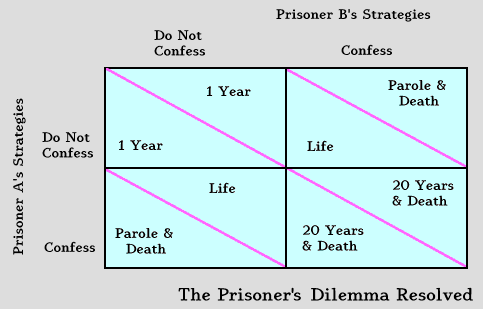More Prisoner's Dilemma
The story of the prisoner's dilemma can be retold with a slight alteration. Assume that our two criminals belong to an organization of criminals that will kill any member who confesses to the police or testifies against other members of the organization. With this change, the outcome of the story will tend to be totally different: both will remain silent. Self-interest and group interest are identical. This happens not because the motives or goals of the criminals have changed, but because incentives or payoffs have changed. The table below shows the new payoffs. A paradox of this case is that imposition of this "death penalty" can actually improve the well-being of individuals making up the group. One would not normally think that making possible outcomes worse could improve results.

For Hobbes, the introduction of government could change payoffs so that cooperative behavior would replace the "war of all against all." But Adam Smith better illustrates the results of this second story. His Wealth of Nations argues that the well-being of the group can be consistent with the pursuit of self-interest if the right incentives, which Smith said were free trade and competition, existed. Nowhere does he explain his point better than when he talks about the butcher, baker, and brewer who provide quality products because they love themselves, not because they love humanity.
Because people respond to incentives, groups cannot survive and prosper unless they find ways to make individual self-interest consistent with group interest. This is a problem for the largest of organized groups, a nation, as well as for many of the subgroups within it. There are two basic ways to deal with this problem. One is the Hobbesian way of regulation and planning from the top. The other is the Smithian way of private-property rights and the market.
Though we could jump to consider these two ways of coordination, it might be better to pause to defend the assumption of self-interest used in the prisoner's dilemma.
Copyright Robert Schenk